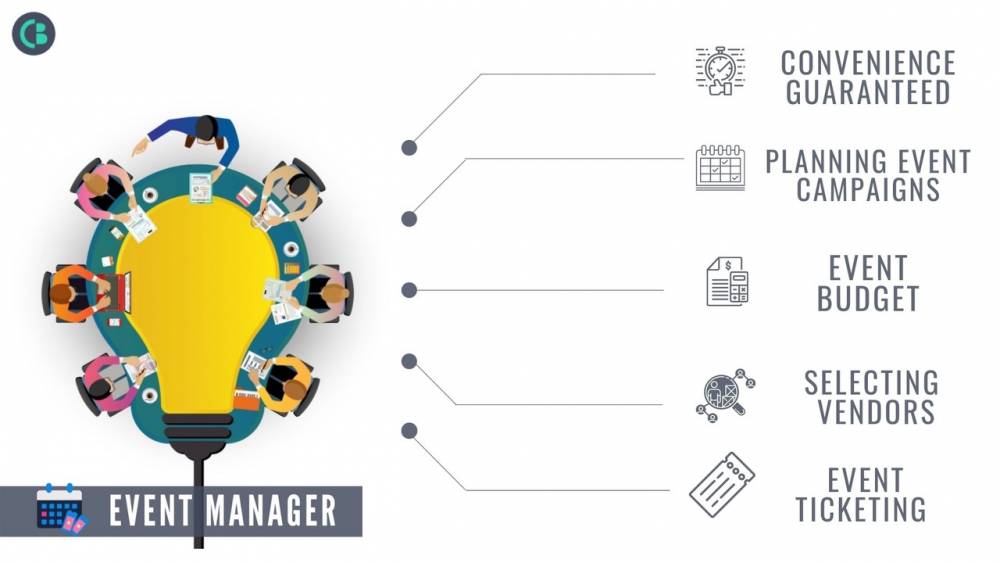
What an Event Manager Does - And Their Critical Responsibilities
An event manager is in charge of planning, organizing, and managing various events. What an event manager does is make or break an event depending on his skill.
What an Event Manager Does - And Their Critical Responsibilities
Event managers are pivotal in the overall success of an event, whether it is online or offline. From planning an event to executing promotions, management, and successful closure of events, the skills of event managers are significant. We can easily say that they're solely responsible for managing it end to end. There's a lot to be planned, right from the range of events to be held to marketing to making sure the target audience has been sent invites and are engaging with the event, a successful event campaign needs a perfect plan. Events also play a significant role in successful marketing campaigns for brands, products, and companies. There are lots of responsibilities of an event manager; let's discuss all their critical roles and responsibilities here.
What Are The Duties of an Event Manager?
The most notable duties of an event manager are:
- End to end event managing
- Hiring a skilled team
- Handling the events team & stakeholders
- Working around the event budget
- Planning and executing the event campaigns
- Selecting and finalizing vendors for the venue
- Event ticketing
The primary focus of every event manager is to create positive experiences for the attendees and the organizing company. Event managers usually have to juggle a lot of tasks. They scout for locations, invite bids, manage vendor, sponsor relationships, and ensure proper communications. In online events, the event manager has to liaise with main stakeholders to organize the event successfully. They have to execute all the activities via event management software.

What are the stages of the event management process?
There are various stages for event management. Let's check them out:
Stage 1- Research and Goal setting
It involves a lot of research, primarily for the selection of venue, understanding consumer behavior, selecting a theme of the event, and making everything align with the stakeholders' objectives. During this process, you need to work out things such as finding the team, selecting the venue, raising funds, training people, brainstorming ideas for a successful event. Carefully assess the expectations and create smart strategies to ensure optimum turn up. Once the event manager has completed these basic things, they now have to formulate strategies and set the goals for the event.
Stage 2- Design Your Event
The next step is to design the event and work out basic elements such as delegating responsibilities to team members. Effective delegation is key for event success. Event managers need to allocate responsibility to each team member for effective results. These team members help design the event better and lead to collaborative success. Designing helps you execute things like inviting the guests, ensuring optimum turn up, small details like organizing food and drinks smartly.
Stage 3-Focus on the details for a successful event
Real gold lies in the details of an event. It is how seamlessly event managers and their team execute the critical steps of the events. Whether the event is online or offline, freeing the process from any bottlenecks is a must. Again, assigning responsibilities to the team members will do the deal for you. Make sure the team understands their roles. Each member should perform top of their capacity and focus on delivery without compromising the client/customer experience. Make sure you keep the audience informed and engaged way before the event. Always evoke some curiosity, so they are hooked on the event even days before it starts. You can also distribute some merch or promotional gifts to create hype for the event. This is where the event manager's relationship with the owner/stakeholder becomes crucial. They need to be clear on the end goal, and it should be communicated to everyone involved with the event.
Stage 4- Post-event communication with guests and team
Communication is the key both pre and post-event. It is always advisable to take inputs from the team, stakeholders, and attendees. Not only will this help gauge the success of the current event, but will also help you plan future events better. Event managers should also sit down with the team members and share their performance outcomes. A simple mantra for successful event planning and execution is continuous improvement. Feedback will help plan the events much better.
.jpeg)
Must have skills for an event manager:
Organizational Skills - Event managers should possess great organizational skills. They should have an eye for detail and must thrive on big projects. Overall organizational skills including leadership and problem solving are a prerequisite for successful event managers.
Creativity - Event managers should be able to think out of the box. They should add value and bring something creative to the table. This would translate into a standout and successful event.
Communication - One of the must-have qualities for event managers is great communication skills. They should have good command on communicating ideas and information. They must be quick and effective in communicating required tasks.
Networking Savvy - Event planners are usually great networkers. Networking is a key feature of successful people in the event industry. Right from selecting the venue to choosing the vendors, sponsors, and partners, it all boils down to effective networking.
Client-first Approach - Event managers should keep the clients and customers at the center of everything they do. They should listen actively to what the clients or senior management want and then deliver as required.
Advantages of Switching From Offline to Online Event Management System
Technology has made everything a lot easier; the same goes for the event industry, especially event management. Modern event management tools have made processes super easy to manage and monitor.
Read More: Why do you need an event ticketing system?
It is the best time to switch to smart online event management software like Eventmie Pro. It helps plan the event seamlessly while saving you costs. You can automate a lot of your event-related processes through Eventmie Pro, like selling tickets, collecting payments, sending reminders, and more. You get a lot of actionable insights from the software to make your future events a sure success. Invest in Eventmie Pro right now only at $59.
